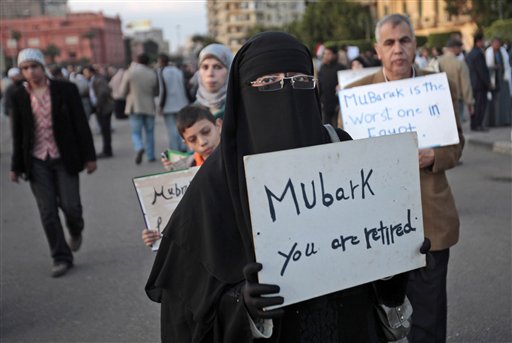The main characters involved implicated in the demostrations read like a who’s-who list of Egypt’s primary political factions.
President Hosni Mubarak: Now in his 30th year in office, Egypt’s fourth president so far has refused to surrender his office despite a unifed call from protestors for him to step down.
- Mubarak is a “senile and paranoid” 82 year-old autocrat who has groomed his son to succeed him in office. (Foreign Policy, HuffPost)
- Mubarak touts Egypt’s commitment to freedom of speech, but he’s arrested thousands under the country’s Emergency Law. (New Yorker)
- Mubarak will hold on to power as long as possible. (Guardian)
Mohamed ElBaradei: Former chief of the International Atomic Energy Agency and Nobel Peace Prize laureate, ElBaradei serves as somewhat of a exiled hero to Egypt’s opposition party. We profiled him recently. (He’s also pretty good on Twitter!)
- ElBaradei is a well-educated, Egyptian-born recipient of the 2005 Nobel Peace prize. For 12 years he served as director general of the IAEA and has lived abroad for much of his adult life. (Nobel)
- ElBaradei was a vocal opponent of the U.S. invasion of Iraq and has since encouraged diplomatic solutions to Iran’s nuclear policy. (New York Times)
- ElBaradei became the face of the opposition movement as protests against President Mubarak escalated. (Guardian)
Muslim Brotherhood: The largest and oldest Islamic political group could lead the next regime in Egypt. We profiled them recently, too.
- The Muslim Brotherhood is not a terrorist organization, though they have been connected to violence in the past. But it’s generally complicated as the group has many factions. (Foreign Policy)
- The Muslim Brotherhood is built on the idea that Islam is not simply a religion but a way of life. (CNN)
- The Muslim Brotherhood, as the largest Islamic group in the country, will become increasingly important as Egypt looks to build consensus. (New York Times)


